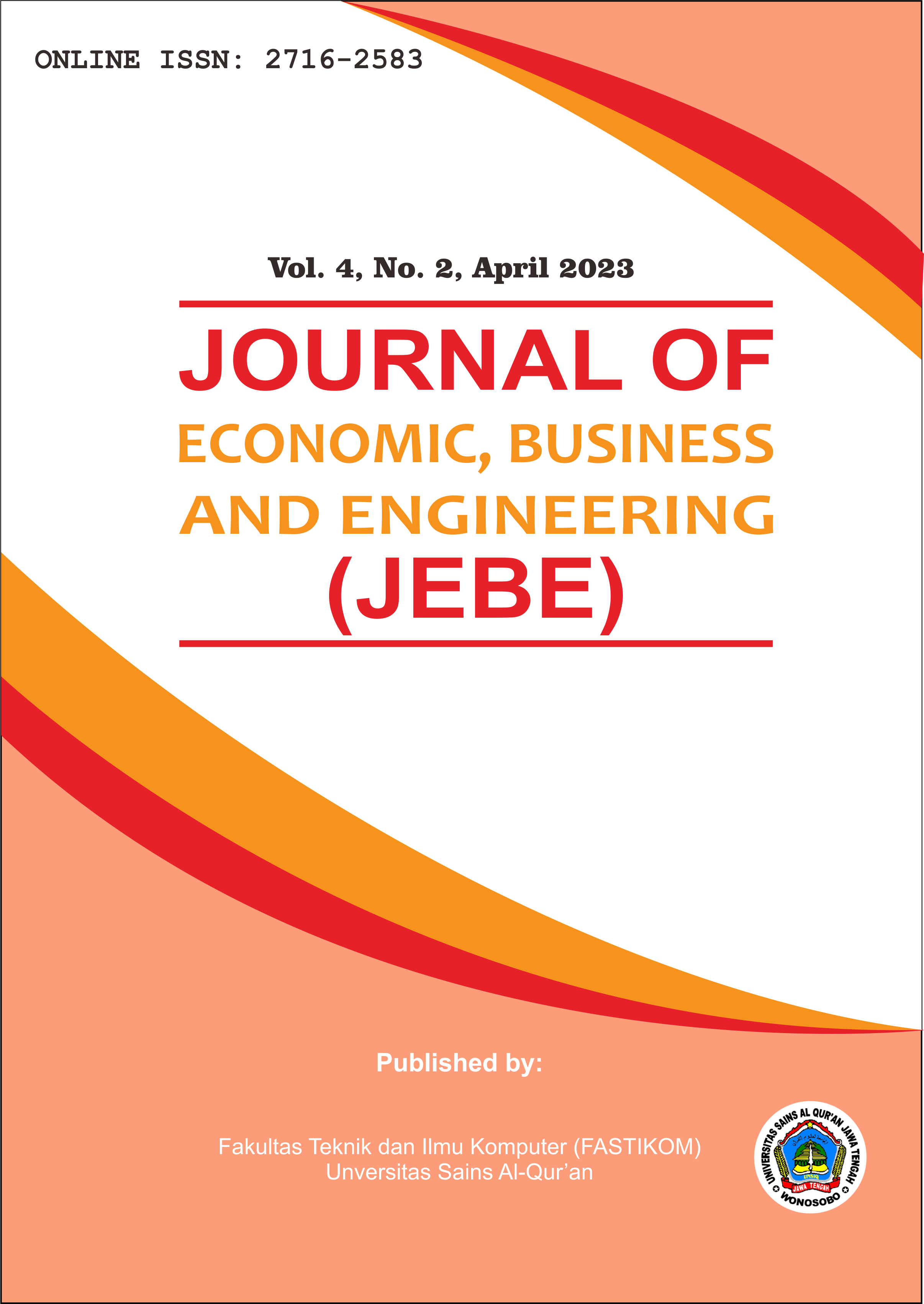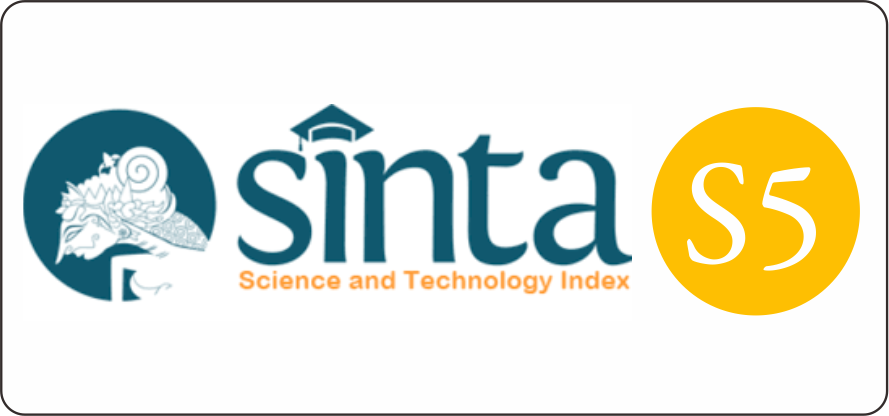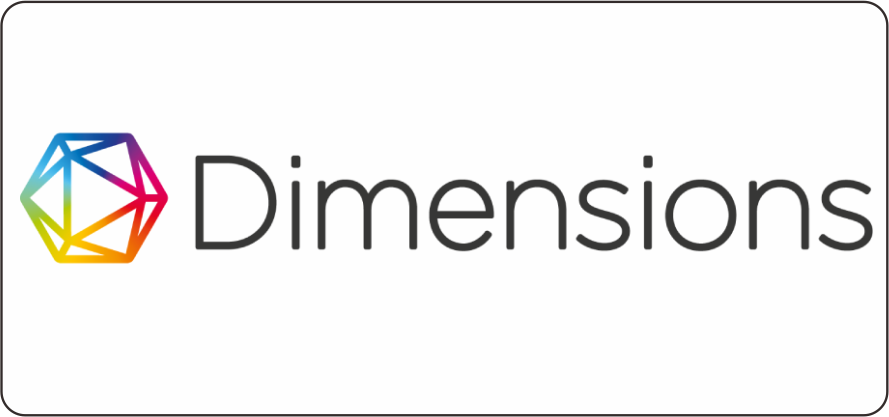THEORY OF REASONED ACTION DALAM MEMPENGARUHI NIAT ADOPSI TIKTOK DIKALANGAN UMKM
DOI:
https://doi.org/10.32500/jebe.v4i2.4334Keywords:
Sikap, Norma Subjektif, Niat Adopsi, Tiktok, UMKM YogyakartaAbstract
Tiktok merupakan salah satu media sosial yang memiliki banyak sekali pengguna dan dapat digunakan untuk pemasaran produk melalui fitur e-commerce yang disediakan. Sayangnya hal tersebut belum dapat dimanfaatkan secara maksimal oleh para pelaku UMKM dalam memasarkan produk mereka. Hal tersebut dapat dilihat dari sedikitnya jumlah UMKM yang telah memanfaatkan platform digital. Penelitian ini bertujuan untuk mengidentifikasi faktor penyebab niat adopsi Tiktok dikalangan UMKM berdasarkan theory of reasoned action. Penelitian ini dilakukan di dengan menguji 56 data responden yang merupakan pemilik UMKM di Daerah Istimewa Yogyakarta. Berdasarkan data yang diperoleh kemudian dianalisis dengan pendekatan SEM-PLS. Setelah dilakukan pengujian diketahui bahwa baik sikap pemilik ataupun norma subjektif ternyata sama-sama memiliki pengaruh posistif signifikan terhadap niat adopsi tiktok dikalangan UMKM. Hasil penelitian ini menegaskan bahwa theory of reasoned action masih sangat relevan dalm memprediksi niat perilaku konsumen. Diharapkan hasil penelitian ini dapat dijadikan acuan bagi seluruh stakeholder yang menangani UMKM dalam penyusunan strategi pemasaran produk mereka melalui media sosial.
References
Alam, S. S., Jani, M. F. M., Omar, N. A., Hossain, T. & Ahsan, N. 2012. Empirical study of theory of reason action (TRA) model for ICT adoption among the Malay based SMEs in Malaysia. Business Management and Strategy, 3(2), pp 43-53.
Annur, C. M. 2022. Media Sosial dengan Jumlah Pengguna Aktif Terbanyak Global (Oktober 2022) [Online]. Jakarta, Indonesia: databoks.katadata.co.id. Available: https://databoks.katadata.co.id/datapublish/2022/11/23/ini-media-sosial-dengan-pengguna-terbanyak-pada-oktober-2022 [Accessed Januari 2023].
Ari, S. 2021. Pemda DIY: Masalah Terbesar UMKM di DI Yogyakarta adalah Pemasaran [Online]. Yogyakarta, Indonesia: jogja.tribunnews.com. Available: https://jogja.tribunnews.com/2021/04/22/pemda-diy-masalah-terbesar-umkm-di-di-yogyakarta-adalah-pemasaran [Accessed Januari 2023].
Bashir, I. & Madhavaiah, C. 2015. Consumer attitude and behavioral intention towards Internet banking adoption in India. Journal of Indian Business Research, 7(1), pp 67-102.
Chen, M.-F. 2016. Extending the theory of planned behavior model to explain people’s energy savings and carbon reduction behavioral intentions to mitigate climate change in Taiwan–moral obligation matters. 112, 2), pp 1746-1753.
Chen, Y., Harncharnchai, A. & Saeheaw, T. Current and future direction of social media marketing in SMEs: A systematic literature review. EEE International Conference on e-Business Engineering, 2021 Guangzhou, China. IEEE Xplore.
Copeland, L. R. & Zhao, L. 2019. Instagram and theory of reasoned action: US consumers influence of peers online and purchase intention. International Journal of Fashion Design, Technology and Education, 13(3), pp 265-279.
Firmansyah, L. M. 2022. Berapa Pengguna Internet Indonesia per 2022? Berikut Datanya [Online]. Jakarta, Indonesia: fortuneidn.com. Available: https://www.fortuneidn.com/tech/luky/berapa-pengguna-internet-indonesia-per-2022-berikut-datanya [Accessed Januari 2023].
Goodhue, D. L., Lewis, W. & Thompson, R. 2012. Does PLS have advantages for small sample size or non-normal data? MIS Quarterly, 36(3), pp 981-1001.
Jayani, D. H. 2020. Berapa Sumbangan UMKM Terhadap Perekonomian Indonesia? [Online]. Jakarta, Indonesia: databoks.katadata.co.id. Available: https://databoks.katadata.co.id/datapublish/2020/05/20/berapa-sumbangan-umkm-terhadap-perekonomian-indonesia [Accessed Januari 2023].
Kemenko. 2021. Optimalisasi Produktivitas UMKM melalui Go-Digital dan Go-Legal [Online]. Jakarta, Indonesia: Kementerian Koordinator Bidang Perekonomian. Available: https://www.ekon.go.id/publikasi/detail/3016/optimalisasi-produktivitas-umkm-melalui-go-digital-dan-go-legal [Accessed Januari 2023].
Kräuter, S. G. & Faullant, R. 2008. Consumer acceptance of internet banking: the influence of internet trust. International Journal of Bank Marketing, 26(7), pp 483-504.
LaCaille, L. 2020. Theory of Reasoned Action, Encyclopedia of Behavioral Medicine: Springer.
Liu, H. T. & Tsaur, R.-C. 2020. The theory of reasoned action applied to green smartphones: Moderating effect of government subsidies. Sustainability 12(15), pp 5979.
Liu, M. T., Liu, Y. & Mo, Z. 2020. Moral norm is the key An extension of the theory of planned behaviour (TPB) on Chinese consumers’ green purchase intention. Asia Pacific Journal of Marketing and Logistics, 32(8), pp 1823-1841.
Luthen, M. D. & Soelaiman, L. Factors affecting the use of social-media TikTok to improve SME performance. 3rd Tarumanagara International Conference on the Applications of Social Sciences and Humanities, 2021 Jakarta, Indonesia. Atlantis Press, 212-217.
Maryam, S. Z., Ahmad, A., Aslam, N. & Farooq, S. 2021. Reputation and cost benefits for attitude and adoption intention among potential customers using theory of planned behavior: an empirical evidence from Pakistan. Journal of Islamic Marketing, 13(10), pp 2090-2107.
Massoro, Z. Z. & Adewale, N. T. 2019. Influence of attitude, subjective norms and personal innovativeness on intention to use open access journals: A case of agricultural research institutes. Library Philosophy and Practice, 2019(1-13), pp.
Mayreri, A. N. & Milanyani, H. 2022. The influence of e-WOM on Tiktok towards information adoption, information usefulness and purchase intention (A study case of Wardah Beauty). e-Proceeding of Management, 8(6), pp 3276.
Perri, C., Giglio, C. & Corvello, V. 2020. Smart users for smart technologies: Investigating the intention to adopt smart energy consumption behaviors. Technological Forecasting and Social Change, 155(1), pp 119991.
Riley, J. M. & Klein, R. 2021. How logistics capabilities offered by retailers influence millennials’ online purchasing attitudes and intentions. Young Consumers, 22(1), pp 131-151.
Ryu, J. S., Fortenberry, S. & Warrington, P. 2023. Understanding omnichannel shopping behaviors: Incorporating channel integration into the theory of reasoned action. Journal of Consumer Sciences, 8(1), pp 15-26.
Sa’ad, S. M. 2022. Implications of the adoption of social media platform on marketing strategy of Small and Medium Enterprises (SMES) Kano State in Nigeria. International Journal of Innovative Science and Research Technology, 7(10), pp 1090-1095.
Saeedi, S. A. W., Sharifuddin, J. & Seng, K. W. K. 2020. Intention on adoption of industry 4.0 technology among small and medium enterprises. International Journal of Scientific & Technology Research, 9(2), pp 4472-4478.
Stevens, J. 1996. .Applied multivariate statistics for the social sciences. Mahwah, NJ, USA: Lawrence Erlbaum.
Sumarliah, E., Khan, S. U. & Khan, I. U. 2021. Online hijab purchase intention: the influence of the Coronavirus outbreak. Journal of Islamic Marketing, 12(3), pp 598-621.







